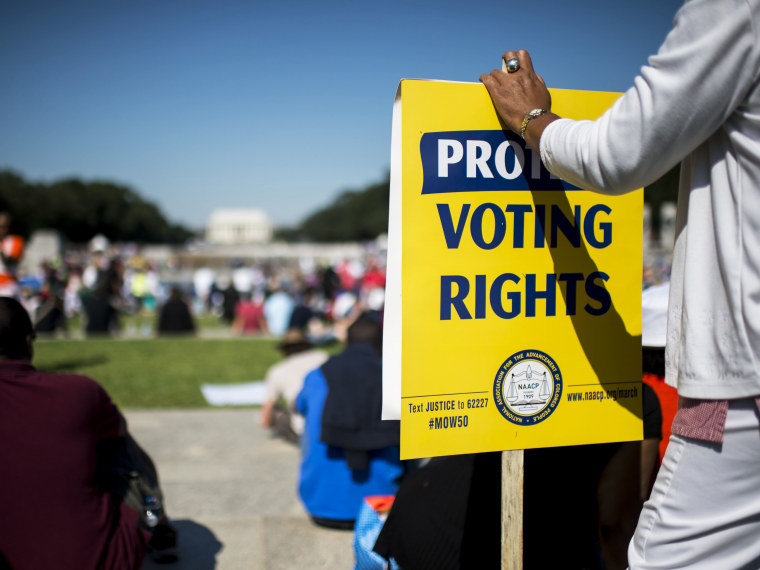Hours after speaking on the steps of the Lincoln Memorial to honor the 50th anniversary of the March on Washington, President Obama said his administration is hopeful that Congress will fully restore the Voting Rights Act, but that his administration will remain vigilant in its protection of voting rights in the meantime.
The president said in a Wednesday interview with PBS NewsHour that he was ready to use all the tools available to protect the vote.
"In those areas it’s true that we’ve had some opinions, the most prominent one being the case where the Roberts court struck down a key segment of the Voting Rights Act, where we just have to try a whole range of approaches to make up for those decisions," he said. "So I will be working with people like John Lewis in reaching out to both Republicans and Democrats in Congress to see if Congress is prepared to amend the Voting Rights Act to ensure that people are not being prevented from voting."
"But Congress doesn’t move real quickly around here," he continued, "and if we can go ahead and move administratively so that our attorney general can go ahead in jurisdictions that seem to be intent on preventing people from voting and that have a racial element to it, even though largely it’s probably for partisan reasons, then we need to go ahead and –and enforce the law. And the Voting rights Act has a number of tools. Section 4, which was struck down, was not the only tool available."
The multi-tool approach may end up being a necessary one, since two months after the Court's decision, Congress has yet to map out a path forward to restoring the Voting Rights Act, despite strong support from many Democrats and at least one Republican.
So far the Justice Department has taken action only in Texas, but the move could provide a picture of what the department's approach will be in the future.
The first challenge came in late July, when Attorney General Eric Holder announced a lawsuit to reinstate preclearance requirements for Texas changes to voting law. Texas had been subject to preclearance prior to the Supreme Court's June decision under Section 5 of the Voting Rights Act. In this new challenge, Holder argues that Texas should now be covered under Section 3, which says that if a state or jurisdiction has shown intentional discrimination in its election law changes, it can be subjected to preclearance as well.
A second lawsuit, announced just last week, relies on a slightly different tool in the Voting Rights Act, Section 2—which bars any election law change that has a discriminatory result. The same lawsuit also reiterates the call to see Texas returned to preclearance under Section 3.
With the legal wheels set in motion in Texas, all eyes now turn to North Carolina, where a controversial and major change to election law has inspired calls for similar action from the DOJ. Democratic Senator Kay Hagan of North Carolina called on the Justice Department to step in the day after Pat McCrory signed the law which institutes a new voter ID requirement, shortens early voting and ends same-day registration, and ends a pre-registration program that helped teenagers prepare to vote.
The battle in North Carolina could be a very difficult one, as election law expert Rick Hasen noted in a recent article.
Whether bringing challenges in North Carolina or elsewhere, Hasen and other legal experts tend to agree that the protections provided by Section 5 are stronger than those provided by Sections 2 or 3. One of the key differences is the burden of proof: under Section 5, states are forced to prove their laws are not discriminatory, whereas under Section 2 and Section 3, the challengers must make their case. So while the Obama administration's commitment to the task is welcomed by voting rights advocates, the job of protecting the vote has definitely become a more arduous task.
